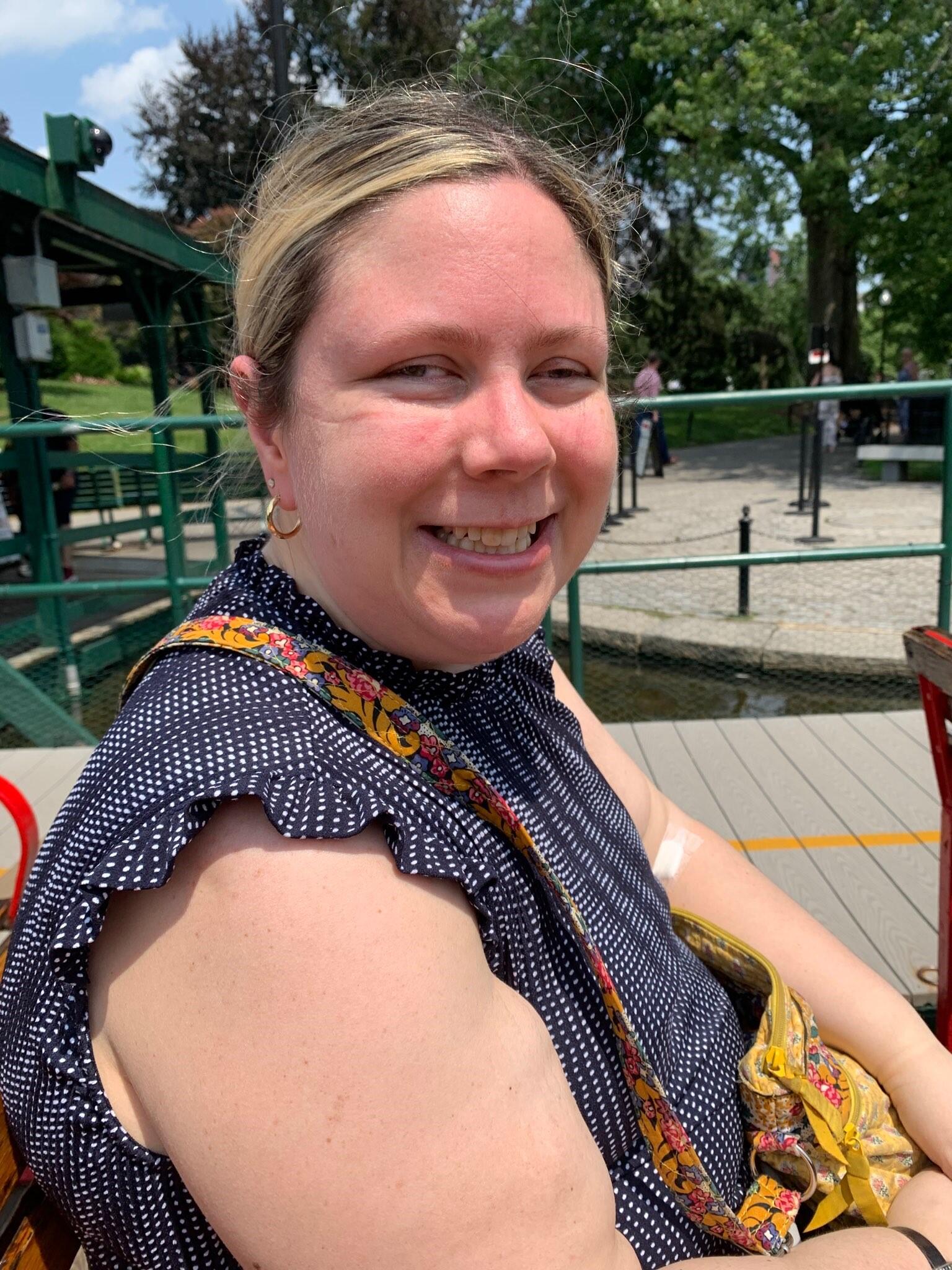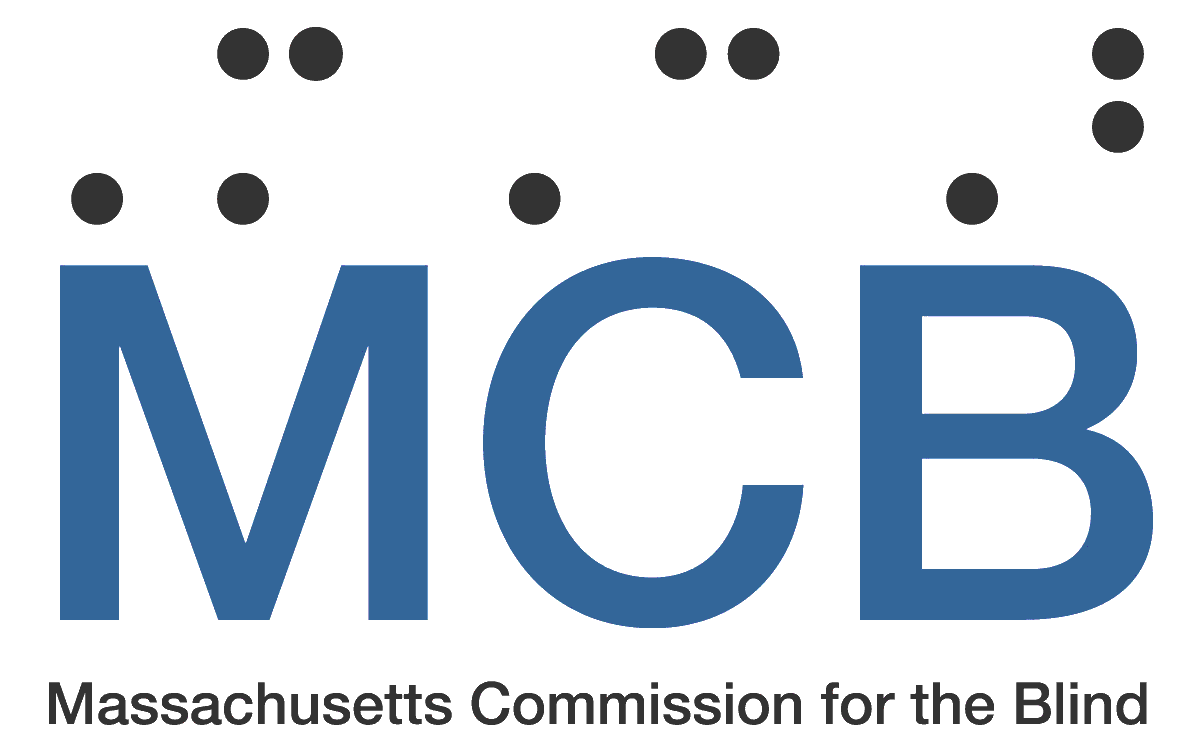- Massachusetts Commission for the Blind

Video: The Emily Dussault Story - Audio Profile by The Audible Local Ledger
Skip this video The Emily Dussault Story - Audio Profile by The Audible Local Ledger.By Rachel Ng
Self Advocate, Seek Allies & Stay Strong: The Emily Dussault Story
Emily Dussault, 38, of Fairhaven, serves as Call Center Clerk for the Office of the Secretary of the Commonwealth of Massachusetts.
Her voice is often one of the first people hear when calling the Secretary’s office with questions about starting a business, filing fees, state records, elections, and more.
Most callers do not know Emily is blind.
“They don't know that I'm visually impaired unless I tell them, and I've been trained so well that I don't think they notice,” she said. “When I need to take extra time, I just say I’m going to put them on hold for a moment so I can deal with my computer.”
In 2001, Emily, at the age of 18, was declared legally blind due to retinitis pigmentosa – a rare genetic disorder in which the retina, the back wall of the eye, is damaged or malfunctioning resulting in loss of vision. Over a period of ten years, Emily’s vision degenerated to the point where she could no longer see.
Emily was registered with the Massachusetts Commission for the Blind (MCB) to receive Vocational Rehabilitation (VR) services including career and employment counseling. While living in an apartment in Weymouth, Emily received Vision Rehabilitation Teaching (VRT) Services, in which she learned how to use a stove to cook safely as well as labeling items throughout the house for tactile recognition.
At The Carroll Center for the Blind, in 2012, Emily stayed at the independent living center for 10 weeks followed by three weeks of training to learn how to use JAWS screen reader technology, an assistive technology program that enables her to perform her duties on the computer at work.
“It was kind of like re-learning how to use Windows. They teach you how to use all the keyboard commands,” Emily said of her JAWS training. “It reads everything off the screen to you. They actually use keyboard commands instead of a mouse.”
She also participated in the annual MCB Internship Program, which landed Emily a role within the Secretary’s office.
“I had a really hard time getting employment, so it was really great that I was able to be an intern and then it turned into a full-time position,” she said.
Emily said she had difficulty finding work when employers realized she was blind. Still, the hurdles did not deter Emily from finding a career that matched her skills. She looked for jobs in communications and journalism, disciplines she majored in throughout college.
“It seemed like as soon as employers knew that I was visually impaired, they didn't want to hire me; they would say there was a better fit for the position, so I had a hard time getting a job,” she said. “But it has been great working for the State.”
Emily says that positions within state agencies seem to be more accommodating for people with disabilities than jobs in the private sector, but she hopes that changes in the future for other job seekers.
This August will be Emily’s eighth year working at the Secretary’s office.
Emily is tasked with answering inquiries from residents and businesses looking for information on a host of topics including questions on how to register a business, how to fill out forms, how to vote, and how to pay business fees.
The variety of calls she receives keeps her work exciting.
“I like helping people and it's always fun to take different calls every day and talk to different people – it's always different,” said Emily. “I like to help people.”
Emily’s disability has also led her to be more compassionate and patient with callers navigating forms and documents issued by the Secretary’s office. Sometimes, the person on the other line also has a disability or is elderly. “I know how hard it can be,” said Emily.
One time, Emily said a caller told her that they were also blind, used JAWS, and needed assistance navigating the Secretary’s website. “I told her that I was also visually impaired, and she was really grateful,” explained Emily.
Outside of work, Emily finds joy in freelance writing for a variety of publications.
“I've had a lot of different articles assigned, and I've loved writing all of them,” said Emily.
The career advice that Emily hopes to share with other individuals who are blind or are visually impaired is to self-advocate and find allies – whether that’s an organization or other like-minded people.
“People definitely need to advocate for themselves, and it might be difficult, or they might think, ‘Well, I'm not getting a job and the doors are being slammed in my face.’, but just be persistent,” said Emily. “But develop a network of support, like staff at MCB or Carroll Center, who can help advocate on your behalf.”
“Just keep going because you never know what kind of job you might come upon,” said Emily.
Listen to an audio reading of Elana's story provided by our partners at the Audible Local Ledger, part of the Massachusetts Audio Information Network, your MAIN source for accessible Community News & Info: http://www.audiblelocalledger.org/mcbinfo.html.
